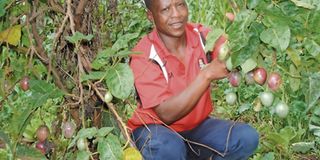Tree tomato farmer builds wealth

Maina Kanai harvests tree tomatoes in his farm in Elburgon, Nakuru County. He attributes his current good yields to good rains, frequent use of manure and spraying the plants at the appropriate time. PHOTO | JOHN NJOROGE | NATION MEDIA GROUP
What you need to know:
- He says he has pocketed a tidy sum from his quarter-acre parcel of land since the outbreak of the Covid-19 pandemic.
- Kanai said growing tree tomato fruits is a good entry point for anyone interested in venturing into agribusiness because apart from seedlings, only water and manure is required.
- He said the demand is currently very high, forcing him to buy the produce from other farmers to satisfy his clients.
- He attributes this to good rains, frequent use of manure and spraying the plants at the appropriate time.
It is a chilly morning as we walk for three kilometres from Elburgon town in Nakuru County to Maina Kanai’s farm.
Donning a red short-sleeved T-shirt, navy-blue trouser and a pair of black gumboots, we find him harvesting ripe tree tomatoes.
He says he has pocketed a tidy sum from his quarter-acre parcel of land since the outbreak of the Covid-19 pandemic.
“In 2018, I planted 120 seedlings of non-grafted tree tomatoes at a cost of Sh6,000. I waited for two weeks and sprayed them with PHI insecticide to kill aphids,” said Kanai, adding that he used organic manure during planting.
He said grafted or local tree tomato seedlings are ideal because it easily adapts to any climate and is rarely affected by diseases.
Kanai said growing tree tomato fruits is a good entry point for anyone interested in venturing into agribusiness because apart from seedlings, only water and manure is required.
He said the healthy-looking plants and fruits have been attracting passersby, many of whom have become his customers.
By the end of the year, he started harvesting and selling his fruits to local markets.
“I have received good money since the Ministry of Health urged Kenyans to consume a lot of fruits to boost their immunity to fight Covid-19,” said Kanai.
He said the demand is currently very high, forcing him to buy the produce from other farmers to satisfy his clients.
He said a kilogramme of tree tomatoes retails at Sh80, up from Sh50 and Sh10 per fruit.
Kanai used to harvest once per month but he now does it every two weeks.
He received the highest amount of money from the venture in May since he started the business almost three years ago.
TRANSPORT IS A MAJOR CHALLENGE
“I got Sh20,000 from the sales. That was the highest amount I ever earned from these fruits,” he said.
Kanai noted that each tree now produces between 200 and 500 fruits, up from between 100 and 150 fruits.
He attributes this to good rains, frequent use of manure and spraying the plants at the appropriate time.
Before the pandemic struck the country in March, he used to make Sh5,000 per month.
“I have a lot of water conserved in the big tanks, which I will use for drip irrigation during the dry season,” he said.
Kanai said transport is a major challenge since the county government directed traders from Wakulima Market in Nakuru town, where most of his clients operate from, to relocate to Afraha Stadium to combat the spread of the novel coronavirus.
The farmer said the cessation of movement in and out of Nairobi has not affected him greatly.
“I used to sell my fruits mostly in Parklands and Westlands in Nairobi. When the lockdown was imposed, I thought my business would sufffer greatly. However, the demand in the local market has increased,’’ said Kanai, adding that he has learnt a lot on various farming techniques through field days, agricultural shows and seminars.
He is looking forward to the full reopening of the economy, saying he expects his venture to thrive.
“I hope to supply more fruits to schools than I used to before the disease struck. I urge the government to disburse funds to schools on time once they are reopened,” he said.
Kanai plans to increase the portion under the crop to one acre to meet the increasing demand.
An officer from the Nakuru Agriculture department, who sought anonymity because he is not authorised to speak to the media, urged farmers to seek information and guidance from specialists before spraying their crops with pesticides.
He said wrong use of pesticides would lead to unnecessary losses.
“Wrong spacing and incorrect spraying of your crops can lead to low production. Ensure you visit disease and insect experts from our offices in order to avert the challenges many farmers face,” he said.





